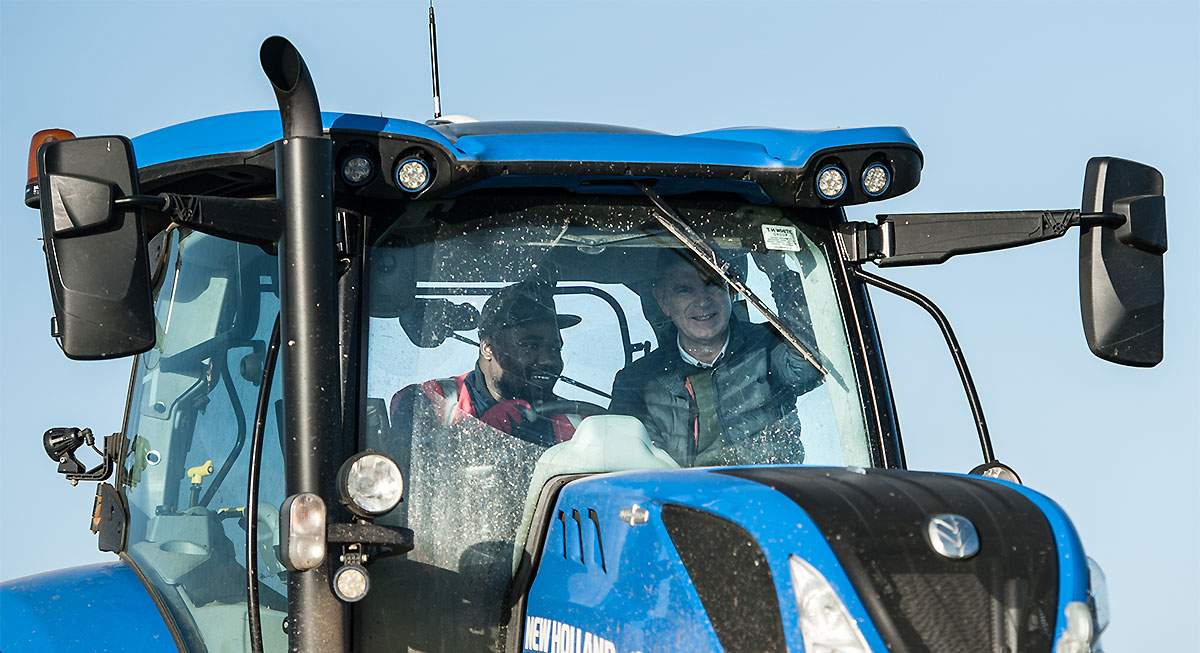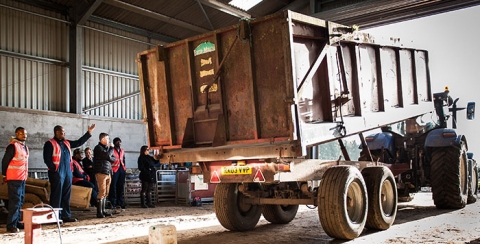Angolan mobile phone giant joins with the RAU to develop future farmers

21 Mar 2019
Angolan agriculture students are training in the UK in order to return home and kickstart the rural economy, in a ground-breaking partnership between leading Angolan telecoms company, UNITEL, and the RAU.
UNITEL is funding six talented Angolan students, selected from over 500 applicants, to follow a programme of postgraduate training at the Royal Agricultural University (RAU) in Cirencester.
The first intake started their studies on the RAU’s Graduate Diploma in Agriculture course in September last year, gaining expert knowledge and farm management experience along with the skills to train others once back in Angola.
Although reliant on subsistence farming, half of Angola’s food is still imported, with a lack of expertise around farm management, operations and agronomy.
To meet the challenge of diversifying the economy away from oil and its own Corporate Social Responsibility aims, UNITEL acquired land in the Province of Malange, to turn into a cutting-edge commercial farm.
The 5,000 ha plot will see the returning group grow crops like maize and soybean, as well as developing a research station to feed innovation back into the centre and provide placements for RAU students in the future.
Around 100 ha will be ring-fenced for a new farming community with families receiving parcels of land and additional training, with the opportunity to take part in the commercial operation and grow future cash crops such as macadamia and mango.
Following the one year of training at the RAU, the students will work for a minimum of three years at the farm.
 Tony Dolton, CEO of UNITEL said: “Our partnership with the RAU will help ambitious young Angolans develop the strategic problem solving skills and technological knowledge we need to help grow a sustainable agri-tech industry, and this project is one small step towards that objective.”
Tony Dolton, CEO of UNITEL said: “Our partnership with the RAU will help ambitious young Angolans develop the strategic problem solving skills and technological knowledge we need to help grow a sustainable agri-tech industry, and this project is one small step towards that objective.”
Professor Joanna Price, Vice-Chancellor of the Royal Agricultural University said: “Global food security is one of the biggest challenges of our age. The world is facing another agricultural revolution – this collaboration builds on our tradition of welcoming postgraduate and applied research students from around the world as well as partnering with industry to find solutions to the biggest issues.
“Our vision is that this ground-breaking project with UNITEL will have a lasting impact on the development of agriculture in Angola.”
Baroness Lindsay Northover, the Prime Minister's Trade Envoy to Angola and Zambia, said: "I am delighted that the RAU is involved in this innovative initiative to train Angolan students in such a key area. The development of Angola's agriculture sector is a crucial part of its drive towards economic diversification and import substitution."
Adilson Vika, 30, from Angola’s capital Luanda, whose background is in environment engineering said: “I applied to join the Academy because I wanted new challenges and because of the goals UNITEL has for contributing to the country’s economy. One of those challenges has been the weather which is so different to the tropical climate, where I come from!
“The teaching at the Royal Agricultural University is at another level of knowledge and the lecturers are really amazing at passing on that knowledge to the students.
“The field walks are wonderful, helping me better understand the concept of agriculture. My experience with the Graduate Diploma in Agriculture (GDA) students has been superb. Many of them are older and they come from different places and from different backgrounds, so it’s interesting every day when we are all together in class.
“This project will not only help me but bring great benefits to the community, like jobs, opportunities, education and health. The country’s economy will also be part of this gain. It’s not only the corporation that is going to win but the country as well.”
Leandro Serena Luciano Kaizer, 31, from Kwanza-Sul province, Sumbe municipality said: “I hope one day Angola will once again become one of the largest producers and exporters of coffee, bananas and other products and I hope to be part of this great step in the economic development of my country.”